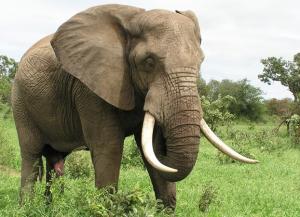Looking for design inspiration? Browse our curated collections!
January 6th, 2018 - 11:41 AM

For years we have been reading headlines like this. What has been done about it? What is being done? Are the poachers getting the best of us? Are the elephant herds really declining? YES, they are declining, but we are making some progress.
On the downside, for instance, there is a huge craft marketplace near Luanda, the coastal capital of Angola. This market is flooded with ivory trinkets, necklaces, bracelets, and to our dismay � whole, raw elephant tusks. More than 10,000 ivory trinkets are for sale here. Business is thriving� even though selling ivory is totally illegal. Laws are ignored. No one seems to care. No one enforces the law. What did we expect from a country that has a machete on its national flag?? Dealers openly sell raw elephant tusks to anyone who pays the price. Who are the buyers? Mostly Chinese.
The two giant bull elephants recently killed were special, known and adored by locals. One was called �Mountain Bull�, a patriarch of a large herd in the region. He was huge. The other went by the name of �Satao�, a 45 year old bull who was believed to be the largest elephant in the entire world. They were killed by poison arrows� a dire and painful way to die. Two great lives were lost so someone could admire an ivory figurine on their mantle. Sickening.
Throughout Africa, tens of thousands of elephants are being killed for their ivory tusks. Yet, experts say there is a decline in elephant poaching. Really? Then much more needs to be done. Martin and Lucy Vigne, animal researchers, recently counted 10,026 visible ivory items for sale at the Benfica Market in Luanda� including whole, raw tusks, not counting the unseen back-up inventory held in reserve.
In May, 2014 airport custom officials in Hong Kong intercepted an astounding 1,740 pounds of ivory hidden away in 32 suitcases from a commercial flight that originated in Angola. As dedicated researchers, the Vignes have found similar quantities of ivory for sale in Nigeria, Egypt, and the Sudan� fleeing at times from angry sellers who feared their livelihood was being threatened.
Ivory is a precious entity in China. The market is designed for the Chinese. Thousands are earning handsome incomes. Where there is ivory for sale, there is wealth. Where there is wealth, organized crime is nearby. And organized crime has the vast financial resources to not only pay top dollar for the ivory, but they can easily buy their way past government officials and police. Angola is known to be the most corrupt country in Africa. Little wonder why 250,000 Chinese live in Angola.
However, on the upside, don�t despair. The Convention on International Trade in Endangered Species (CITES) says that more and more governments are passing laws to fight poaching. They are adding funds and military personnel to the anti-poaching efforts. �We are beginning to see the first signs of a turning and the beginnings of a reduced number poached elephants.� Still, the numbers are overwhelming... 20,000 killed in 2013. Yet it is less than in 2012, and 2012 was less that in 2011. A positive trend? Perhaps. We applaud Yao Ming of basketball fame and Jackie Chan of Hollywood who are doing all they can to educate the Chinese about purchasing ivory products.
Source: excitenews
Comments
There are no comments on this blog. Click here to post the first comment.